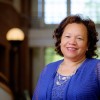This article is more than 5 years old.
On Friday afternoon after my BCALA filled morning, I attended the OCLC symposium entitled “Transformational Literacy: preparing user’s for life’s transitions.” Keynoter Dr. Mimi Ito, discussed principles for libraries to consider that help create environments that encourage lifelong learning as well as the critical role librarians play in this. The future is already here, it is just not so evenly distributed. It is up to us to make sure the positive benefits are available to as broad an audience as possible. To succeed now, we have to continually refresh our stock of knowledge. We must welcome contributions from all regardless of age and institutional status. We need to make sure that our resources are open, remixable and transparent. Panelist defined the four stages of life as student, householder, retired and forest dweller. The student is receiving, the householder is embedding, retired is sharing with others and forest dweller is transcending.
On Saturday I attended the ACRL Personnel Administrators & Staff Development Officers discussion group. One agenda item addressed library assessment assignments. Some libraries had staff devoted exclusively to assessment while others share the responsibility amongst several. Some libraries have added assessment language within position descriptions of all vacancies. Language such as familiarity with assessment efforts, commitment to assessment efforts or ability to assess resources and services were offered as vocabulary examples. The University of Florida discussed the results of an academic recruitment study. The study collected data from about 24 libraries on where they advertised, how many applications received, actual interviews and then finally how many jobs were offered. Of the positions filled, one went to a Black, one to an Asian and then 18 were filled by Whites. I can get the same data, I think, from our WFU Openhire system. It would be good to see university wide results. We could also feed our library results to the Florida study.
The LLAMA Human Resources Emerging Trends discussion group focused on the topic of recruitment. Of the institutions still able to fill vacant positions the song was the same. Lots of applications for entry level positions and then very small pools for the middle management and senior level positions. Fear of not being able to sell there homes, to fear of their spouses not being able to find work were some of the reasons offered. Changes in work ethic, ability to integrate work life balance and a feeling by many that young and energetic don’t necessarily have to be tied together all the time.
The ACRL Metrics discussion was quite promising. The ability to see ASERL and NCES data submitted by our library in a form that is easily retrievable and available for comparison to peer institutions was most impressive. According to the demo, for example, I could retrieve ILL stats from all NC libraries in an user friendly easy to navigate system and export to an excel spreadsheet. That same list could be narrowed to only my peer institutions if I wanted. This is a joint Counting Opinions and ACRL project.
This morning I was asked to participate in an OCLC focus group. I was relieved when the other 5 guest arrived and they also didn’t know the proposed topic. As it turned out OCLC wanted to know how we felt about them and their ability to communicate effectively with their users. They also wanted us to identify the sources we turn to for emerging trends as well as experts. When asked concerning the decoupling from our regional experts, I attempted to explain how difficult it is to think of OCLC without thinking of SOLINET now Lyrasis.
The Evidence Based Management for Libraries session was an overview of LibPAS a library performance assessment system managed by Counting Opinions. Cornell University Library worked with them in this academic case study. Prior to this they used excel spreadsheets to complie 60 -80 page statistical reports annually. Running reports from the data was complicated. LibPAS provided them with a centralized database. With this they could open statisical reporting to staff across the library. Cornell staff believe that data compilation is easier and more readily available for decision makers to extract the data they need.
Rutgers University is using LibSat (Customer satisfaction management module) & LibPAS to improve customer satisfaction and library performance. Counting Opinions representatives acknowledged that they had learned a lot by trial and error but above all had been willing to listen to their customers. They admitted that the patience of their customers coupled with advice and guidance have paved the way for product improvement.
The LLAMA afternoon session featured panelists who spoke on tragedies at Southern University and Colorado State Universities. “Providing Leadership Under Adverse Conditions was the selected topic. What makes people step-up in the time of crises? Comparing the two disasters showed that pre-disaster training may have helped in the Colorado case. The Southern University case that training had not occurred. Both panelist referenced value, trust and morale as key components in the recovery process.

2 Comments on ‘Wanda’a ALA days 1-3’
I am glad you got to the literacy pre-conference. I can’t wait to hear more about it!
Good stuff. Thanks, Wanda!